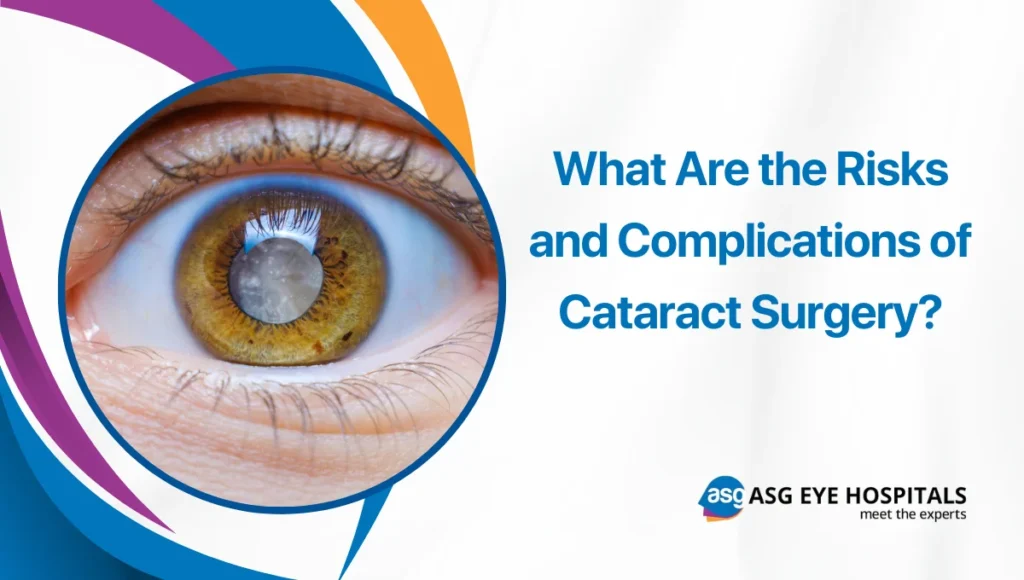Cataract eye surgery has one of the most success rates and generally excellent outcomes. Despite its reputation for being ultra-safe, it is important to realize that, as with any surgical procedure, some risk of possible complications exists with cataract eye surgery. If you’re considering cataract eye surgery, understanding Cataract surgery risks will help you make better decisions and effectively manage your recovery.
Cataract surgery removes the cloudy eye lens and replaces it with an artificial lens, called an intraocular lens. The aim is always to restore clear vision, which is impaired due to a common condition where it becomes opaque over time.

Common Risks and Complications of Cataract Surgery
- Infection After Cataract Surgery : The first thing that may concern any person after cataract surgery is infection. Endophthalmitis is a serious infection that, though it rarely occurs inside the eye after the procedure, still can occur. It might be characterized by severe pain, redness, loss of vision, or swelling in the affected eye. Treatment typically involves administering antibiotics; surgical intervention may also be necessary in some cases. This can be reduced by adhering to your ophthalmologist’s instructions regarding after-surgery eye care and hygiene.
- Retinal Detachment After Cataract Surgery : Another possible complication involves retinal detachment, whereby the retina detaches from the underlying supportive tissue. This can lead to sudden flashes of light, floaters, or even a shadow in your vision. This may occur because of pre-existing retinal problems or if the procedure is complicated. This should be treated as soon as possible to prevent vision loss permanently. Regular follow-up visits are necessary and important for your monitoring during recovery from surgery by your eye doctor.
- PCO (Posterior Capsule Opacification) : The condition, which is also known as posterior capsule opacification or secondary cataract, can be developed by some people months or even years after undergoing surgery for cataracts. The capsule continues to hold the IOL in place; however, it becomes cloudy with time and thus causes problems in someone’s vision, similar to what one experiences with cataracts. Fortunately, this disturbance can be effectively treated with a quick and painless laser procedure known as the YAG laser capsulotomy.
- Disturbances of Vision : Some patients experience glare, haloes, or blurry vision following surgery. Most of these problems are temporary and disappear as your eye gets healed. However, in some people, they persist. In most times, such disturbances are well tolerated by proper adaptation to lighting or wearing corrective lenses. If you still find any difficulties with your vision, discuss your concerns with your ophthalmologist to seek his suggestions.
- Swelling and inflammation: On average, post-operative swelling and inflammation are expected but easily controlled with the use of prescribed anti-inflammatory eye drops. This might further give way to temporary discomfort and blurred vision in vision. One can reduce this by following up on the prescription medication course and also avoiding stressful activities for the eyes, hastening recovery.
- Changes in Vision: Although most cataract surgery is performed to improve vision, some changes may occur that would need further corrective action to accomplish this end. Examples of such refractive errors could be nearsightedness, farsightedness, or even astigmatism. Your ophthalmologist will monitor your vision post-surgery and may prescribe glasses or contact lenses or even recommend another procedure to correct the remaining problems in your vision.
Managing the Risks of Cataract Surgery
- Pre-Surgery Assessment : A good pre-surgery assessment can go a long way in reducing risks. Make sure that your ophthalmologist has checked your general health in terms of your eyes, your medical history, and specifics about your cataract. The evaluation recognizes factors that may boost the chances of developing complications and therefore gives ground for proper planning of strategies for management.
- Care about Post-Operative Care : Post-operative care is essential in recovering well from surgery. This would involve the use of prescribed eyedrops, avoidance of straining activities of the eyes, and attending all follow-up appointments. Your ophthalmologist will be able to give specific advice on your case, and close adherence to those will minimize risks and pave the way for a smooth recovery.
- Recognize and Report Symptoms : It is important to monitor potential symptoms of complications. If you have more serious symptoms like increased pain, sudden vision changes, flashes of light, or new floaters, then definitely call your eye doctor immediately. Early intervention can prevent more serious issues from occurring and preserve optimal vision outcomes.
- Recovery from Cataract Surgery : Recovery time from cataract surgery may be a few days to a few weeks. Most people begin to see much better within a couple of days. Although most people start to see much better within a few days, the complete healing process may take a little longer. During this period, follow your ophthalmologist’s advice and keep all follow-up appointments to be reassured that your eye is healing well.

Conclusion:
While cataract surgery is so effective and highly overall completed without much trouble, it is equally good to understand that there are certain possible risks and complications associated with the surgical process. Awareness and adherence to the advice of your eye care professional will help you manage such risks effectively to eventually enjoy the results of restored vision. Remember, your ophthalmologist is your best resource on how to handle the healing process and answer any of your questions.
If you are in the market for cataract surgery, don’t hesitate to bring anything up that confuses or worries you to your eye doctor. They will offer individualized advice and help to make things more understandable, which will allow for a smoother process and better results.

